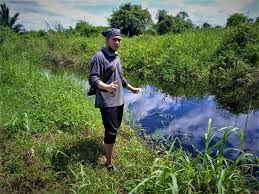
These land rights are considered a basis for inheritance by the people of the Bakong River in the Miri district of Sarawak.
Iban Land Inheritance
There are two types of land recognized in terms of inheritance or transfer. These are termed “old land” and “new land.” New land is considered land that is open for rice cultivation. Old land is a virgin forest where fruit trees are grown.
In many longhouses, new land is parcelled out to residents and the longhouse itself. The land given to the children is fixed. Old land should not be divided but inherited by the child who remains and does not marry out of the longhouse. A person with no blood relationship to the longhouse may not inherit the land.
The child who inherited the land is expected to manage it and pass it down to the next generation. He may not use the land selfishly or to sell portions of it. He must also recognize that the land belongs not only to him but also to him and his descendants.
A Newly Married Couple
A newly married couple lives in the longhouse of the parents of the husband or wife. If the married couple living with the husbands parent divorces after only a few years, the wife has no claim to the land.If the wife lives with the husband for many years, she has the right to some land. A couple can build their own apartment in the longhouse after having children.
The Partition of Land
This example applies to a wife, husband and three children.
The new land is divided into roughly six shares: 1 for the husband, 1 for the wife one each for the three children and 1 for the long longhouse. However, if they move to their spouse’s longhouse they will receive only a small portion of their share.
For the Iban, old land was considered inheritable by the first child only. It should be jointly managed by the longhouse. However, if the old land is abundant, then child 2 and/or child 3 can inherit. This land can produce rubber and fruit.
The Iban consider dividing the land to their children after they have married and have had their own children. If a wife divorces her husband because he is at fault, her children remain with her. All f the “new land” will go to her and her children. After the children become of age, married and have their own children the land reverts to them. Land belong to the children of the marriage.
From:
Rules of Inheritance and Transfer of Land by the Iban of Sarawak: Land as an Intergenerational Resource by Masahiro Ichikawa Research Institute for Humanity and Nature in The Borneo Research Bulletin.
My thanks to Veronica Schmidt
